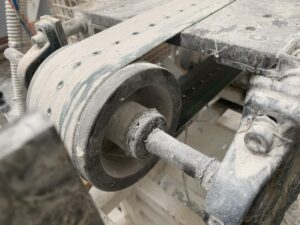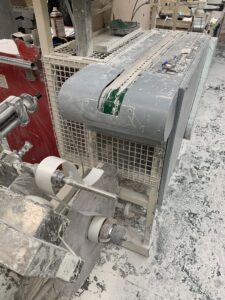A manufacturing company has been fined after a dad was drawn into a machine and broke his arm in two places.
Paul Pearce, a father-of-two from Lymington in Hampshire, was unable to work for over a year following the incident on 12 March 2021.
He had been working a night shift for HS Butyl Limited, a manufacturer of adhesive tapes, at the company’s site at Gordleton Industrial Park in Lymington when he noticed a build-up of butyl on the conveyor belt of the firm’s hot feed extruder machine.
Mr Pearce, who was 43 at the time, then reached into the conveyor to find out how much of the material was blocking the machine.
While doing this however, Mr Pearce’s left arm became trapped and entangled between the machine’s conveyor belt and pulley.

This led to the ulna and radius bones in his left arm breaking with Mr Pearce later requiring surgery to fit metal plates in the arm.
However, these plates broke after being fitted and led to Mr Pearce undergoing two more operations. He was unable to work for over a year.
In a victim impact statement presented to the court, Mr Pearce, who is now 45, said: “It was the combination of the incident itself and all of the time off as a result of the incident which depressed me. It was depressing not being able to do all of the things I would normally do. As a result of the time off…I lost [my partner] and had to move out from my home.”
A Health and Safety Executive (HSE) investigation found that HS Butyl Limited had failed to provide guarding to stop its workers from being exposed to dangerous areas on moving machinery.

HS Butyl Limited, of Gordleton Industrial Park, Hannah Way, Lymington, Hampshire, pleaded guilty to breaching Regulation 11(1) of the Provision and Use of Work Equipment Regulations 1998. The company was fined £80,000 and ordered to pay £4,945.90 in costs at West Hampshire Magistrates’ Court on 23 June 2023.
HSE inspector Lucy Hacker said: “This incident was wholly avoidable, caused by the failure of the company to provide guarding. Employees should be physically prevented from getting into a position where they can come into contact with dangerous parts of machinery, and experience and procedures alone should not be relied upon to control risk.
“The risk of being drawn in and entangled in dangerous parts of conveyors is a well-known and well-documented machinery risk. The guidance on safe operation of extruders is well established and specifies the requirement for these hazards to be guarded.”
This prosecution was supported by HSE enforcement lawyer Rebecca Schwartz.
Source: www.hse.gov.uk

